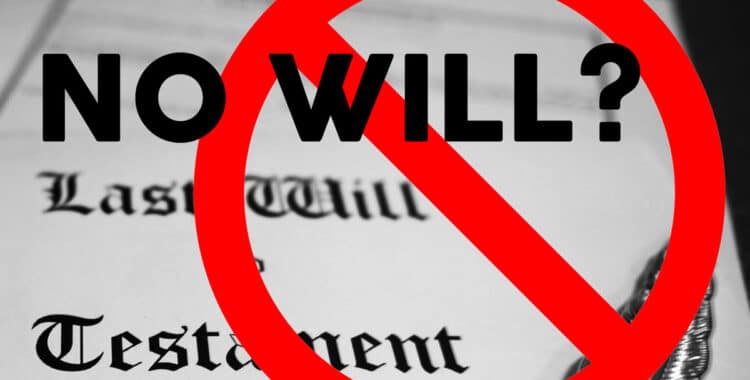Who Acts as Executor when Someone Dies Without a Will?
What Does an Executor of a Will Do?
When someone dies in Alberta without leaving a valid Will, they’re deemed to have died “intestate.” Nearly every Will appoints an Executor—the Executor’s responsibilities include determining who the Estate’s beneficiaries are and locating them, “marshalling”, or gathering the deceased’s assets, liquidating any hard assets into cash, settling any outstanding debts or liabilities owed by the deceased, arranging the funeral, distributing assets to beneficiaries, and filing all necessary tax returns. If the deceased didn’t leave a Will, the Executor is also responsible for applying for a Grant of Administration for the deceased’s Estate.
The Seemingly Logical Choice
When someone passes away without leaving a Will, the question becomes: who is responsible for acting as Executor, and who is entitled to act as Executor? In many cases, a loved one, friend, or family member has provided and cared for the deceased in the years leading up to their death, either formally according to an Enduring Power of Attorney, or informally. While you may expect that the deceased’s caregiver or closest relative would be entitled to act as Executor, that’s not always the case.
What Does Legislation in Alberta Dictate?
The legislation in Alberta, and specifically the Estate Administration Act, outlines a priority sequence of who is entitled to act as the Executor of an intestate Estate. The following list summarizes that priority sequence:
- First Priority: The surviving (still alive) spouse or Adult Interdependent Partner (AIP) of the deceased has first priority to act as the Executor of an intestate Estate. An AIP is typically a common-law spouse, but the term can also refer to someone else who lived in an interdependent relationship with the deceased. A qualified Alberta Wills & Estates lawyer can help you determine whether the deceased had an AIP, based on the deceased’s particular circumstances.
- Second Priority: The children of the deceased are second in priority to the deceased’s surviving spouse or AIP. If the deceased had multiple children they are all entitled to act as Executor and can do so jointly. More commonly, the adult children of the deceased agree to choose one or two individuals from the group to act as Executor, and the remaining children formally renounce their right to act.
- Third Priority: If the deceased left no spouse, AIP, or children, then grandchildren have priority to act as the Estate’s Executor.
- Fourth Priority: Descendants other than grandchildren have priority to act as Executor after spouses, AIPs, children, and grandchildren—for example, great-grandchildren and great-great-grandchildren would fall into this category.
- Fifth Priority: While it’s uncommon, sometimes an individual passes away leaving parents, but no spouse, AIP, children, grandchildren, or other descendants. In such circumstances, the deceased’s parents are equally entitled to act as the Estate’s Executor.
- Sixth Priority: If a deceased passes away leaving no spouse, AIP, children, grandchildren, other descendants, or parents, the deceased’s siblings are entitled to act as Executors of the deceased’s Estate.
- Seventh Priority: Nieces and nephews, in other words, children of the deceased’s brothers and sisters, have seventh priority to act as Executor, but only if they are also beneficiaries of the Estate under the Wills and Succession Act. If you’re a niece or nephew of a deceased, and believe that you may have entitlement to act as Executor of the deceased’s Estate, you should contact a Wills and Estates lawyer to ensure that the legislation permits you to act.
- Eighth Priority: If the deceased died without a Will, and no one who is alive fits into one of the 7 categories listed above, then the deceased’s next of kin, according to the Wills and Succession Act, has priority to act as the Executor of the deceased’s Estate. The Wills & Estates team at West Legal can help you determine who qualifies as next-of-kin pursuant to the Wills and Succession Act.
- Ninth Priority: If all of the above options have been exhausted, a person who is otherwise related to the deceased has the authority to act as Executor.
- Tenth Priority: If the deceased left no spouse, AIP, or relatives at all, a claimant other than a relative, such as a friend or neighbour, can make a Court application to obtain authority to act as Executor.
- Eleventh Priority: The Executor of last resort is the Crown in right of Alberta—in other words, “the government”. If the Crown (government) acted as Executor, they would do so through the Public Trustee’s Office and they would typically only act in extenuating circumstances.
If You’re Not Quite Sure Where You Fit in…
If you’ve recently experienced the death of a family member, friend, or loved one, and you’re not sure who’s entitled to act as the Executor of the deceased’s Estate, we welcome you to contact the experienced Wills & Estates lawyers at West Legal for a free-of-charge, no-obligation consultation.
The law in this area is complicated, and at times downright confusing, but an experienced Wills & Estates lawyer can help you determine whether you may be entitled to act as the Executor of a deceased’s Estate, and what your rights and responsibilities are, regardless of whether you’re entitled to act.

